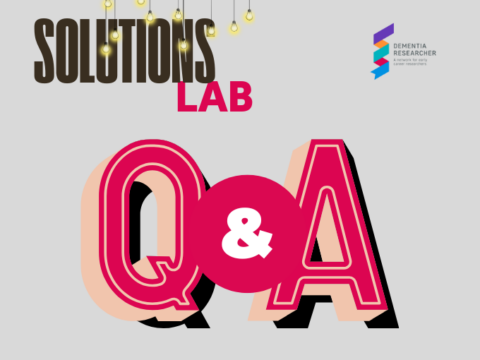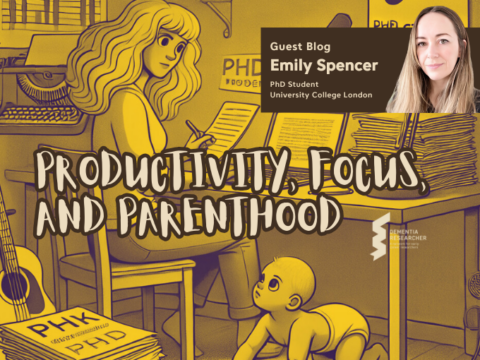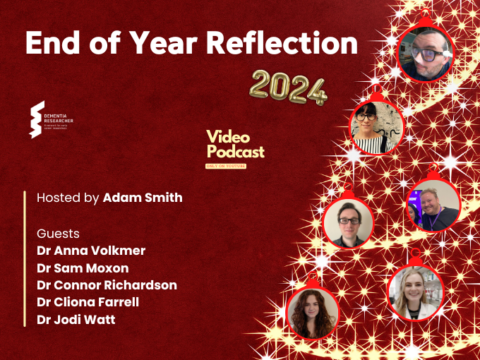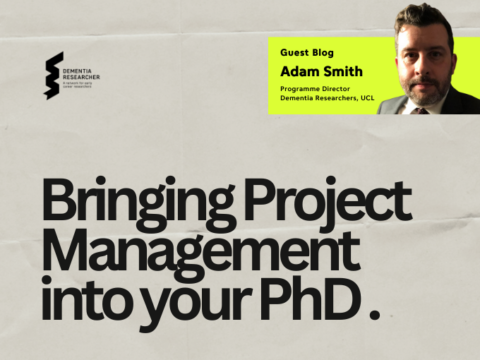This is episode 100! We started the podcast in February 2018, and today we’re celebrating!
Regular hosts Adam Smith & Megan O’Hare have a short informal chat about the show. Sharing a few insights, and thanking you all for making the show such a great success.
Voice Over:
Welcome to the NIHR Dementia Researcher Podcast brought to you by dementiareseacher.nihr.ac.uk in association with Alzheimer’s Research UK and Alzheimer’s Society. Supporting early career dementia searches across the world.
Adam Smith:
Hello. I’m Adam Smith.
Dr Megan O’Hare:
And I’m Megan O’Hare.
Adam Smith:
And together we are the… Dementia Researcher Podcast.
Dr Megan O’Hare:
Dementia Researcher Podcast.
Adam Smith:
And we’re today, Megan and I, to celebrate episode 100. That’s right, folks.
Dr Megan O’Hare:
100 episodes.
Adam Smith:
Since February 2018, we’ve recorded 100 episodes. And I was having to look across those 100 episodes. We’ve also had guess how many guests.
Dr Megan O’Hare:
400.
Adam Smith:
No. Nearly. 370 different guests across 100 episodes.
Dr Megan O’Hare:
Wow. That is a lot.
Adam Smith:
It is. We’ve had a lot of people-
Dr Megan O’Hare:
Very nice people
Adam Smith:
More than once, but absolutely. It’s 370 guests and it’s fantastic. So we thought we’d join you today. Drop into the podcast stream, just to celebrate episode 100 and just talk a little bit about the show just for 10 minutes to give you a few insights about what happens behind the scenes. So, Megan, maybe I am going to ask you a question first, which is your favourite episode.
Dr Megan O’Hare:
I like the ones where I have been to their place of work and then interviewed various researchers because I think they open up slightly differently. Although I do also have to say recording in the studio was nice because Patrick, the sound guy was there. He was really nice and helped me learn about levels. I liked him a lot.
Adam Smith:
Patrick is awesome. If you’re listening, Patrick, we love you. We really miss you. He is still editing the podcast for us, but he’s stuck working at home in London as well. And we’ve been recording all of our podcasts on zoom since March and not getting out and about at all.
Dr Megan O’Hare:
No, I think we’re starting to suffer from that. But what about you, Adam? What are your favourite episodes?
Adam Smith:
Do you know what? It’s similar, I think… Mine are those ones that we do around conferences. Because you never quite know what you’re going to talk about, it’s whatever’s happened at the day. Sometimes you do not even know the panellists are going to be until the day, because I am still chasing around trying to persuade people to contribute. And usually we’re a little bit tired and hung over so conversations can really take a turn. They are my favourites. [crosstalk 00:02:47] And I’m surprised you didn’t mention because… we should add that we’re on edit number four of this, despite both hosting our podcasts, we’re rubbish when it comes to just talking each other. And previously Megan mentioned that her favourite ones were all the ones that she’s recorded because they are the most listened to.
Dr Megan O’Hare:
Yeah, but this time we said we were having a script. I was sticking to the bullet points and that wasn’t the bullet point. But yes, one of my favourite ones, obviously it is the Alzheimer’s Society Fellowship one, which I think Adam, maybe has, is it over 3000 listens?
Adam Smith:
I think he might have Megan. I think you might have noticed that out of the top 10 listened to podcasts, many of them are Megan’s, that she’s hosted. So top number one most listened to podcast out of our 100 is What’s New in Alzheimer’s Society Fellowships with 3,336 players. I’m not sure it’s you though, maybe it’s just because there were a lot of people wanting to know and apply for that fellowship.
Dr Megan O’Hare:
Yeah. Maybe I just pick great topics.
Adam Smith:
Yeah, you could do, because we do tend to… Actually I’ve noticed that though, if I say, “Oh, I’ve arranged a podcast with this thing.” And you’ll say, “Oh. I’d really like to host that one.” Are you cutting and jumping in realizing that these are the ones that people are going to listen to?
Dr Megan O’Hare:
Yeah. And I like the sound of my own voice.
Adam Smith:
Well, you can’t say that, you don’t even listen. You don’t even listen to the podcast.
Dr Megan O’Hare:
Yeah. I have to admit, I don’t listen back to them.
Adam Smith:
So top five, most listened to podcasts, What’s New In Alzheimer’s Society Fellowships, then Rare Dementia Support Impact Study, which had Emily and what’s… Harding. No, it had Emily in it. Quality of Life After A Dementia Diagnosis, that was recorded-
Dr Megan O’Hare:
Another great one.
Adam Smith:
Sussex.
Dr Megan O’Hare:
That was recorded at the university of Sussex. Yep.
Adam Smith:
Alzheimer’s Research UK Drug Discovery, one where we talked about the Drug Discovery Institute. Then coming in at number five Neighbourhoods Dementia Co-creation to Put Research into Action, which was one of mine I seem to recall, but we are a few down there. We’re not the only people that host the podcast. Dr. Anna Volkmer is a regular host too. We’ve also-
Dr Megan O’Hare:
Chris Hardie.
Adam Smith:
Yeah. Chris has joined us quite a few times from UCL. He’s really good at hosting. We’ve had a few hosts, more in the early days than recently. I think we settled into our format… Lakshini of course, who used to work with us at a UCL, she left us and got a new job. Piers Kotting had a little go at it before he left. And am I outing you here for saying that you are going to be going on a little bit of a sabbatical. And this is-
Dr Megan O’Hare:
Yeah. But I think can’t you use keeping in touch days to record podcasts, I think, on maternity leave.
Adam Smith:
Megan’s pregnant, very pregnant right now, and is going to be going on maternity leave in a couple of weeks’ times. So you’ve got one more episode to record before you go off, though.
Dr Megan O’Hare:
Yeah. A Datathon one. A DPUK one.
Adam Smith:
No, not Datathon.
Dr Megan O’Hare:
Oh.
Adam Smith:
Just about… we’ve done a Datathon one.
Dr Megan O’Hare:
Oh, okay.
Adam Smith:
Well that was one of mine. That was very popular, was that one. That hackathon one is in the top 20. I feel.
Dr Megan O’Hare:
Top 100.
Adam Smith:
And we’re going to record that one live as well. Well-
Dr Megan O’Hare:
Yes, we are.
Adam Smith:
We always record them live. We’re going to let people watch us record and ask questions.
Dr Megan O’Hare:
Yeah. So as we’ve discussed today, about the importance of the background on zoom. I’ve got to get some good books, some good paintings, do my hair.
Adam Smith:
We were chatting earlier about, interesting to see how people’s backdrops has developed over the last six months, because we only ever recorded these podcasts in the studio, or if we were out and about conferences and events, because it kind of gets the best quality. But we have resorted to zoom hoping actually that that would bring in more international panellists, but it really hasn’t. It’s still-
Dr Megan O’Hare:
But we want you, if you’re an international dementia researcher, get in touch. Because we can record on zoom, it’s so easy.
Adam Smith:
And actually that’s a nice little segue into talking about our international audience. So about just over half the people listening to the podcast aren’t even in the UK. The United States is the country with the most subscribers and plays followed by the UK then Australia, Ireland, Canada, Denmark, New Zealand, Belgium, Germany, Sweden. But we get listened to in some amazing, we have some subscribers, literally all over the world in some really amazing places. We’ve got 70 in Hong Kong. We’ve got listeners in the Ukraine, Israel, Panama, Republic of Korea. I’m scrolling down this list here, Colombia, Chile. We’ve got 48 subscribers in the Islamic Republic of Iran
Dr Megan O’Hare:
Probably worldwide.
Adam Smith:
Well there’s dementia research happening all over the world, which is fantastic. Right?
Dr Megan O’Hare:
Yeah.
Adam Smith:
We even recorded a podcast in Spanish. Was that last year? This year? I’ve lost track of where we’re at because of-
Dr Megan O’Hare:
Very early this year, I think.
Adam Smith:
Very earlier this year.
Dr Megan O’Hare:
In the studio.
Adam Smith:
Yes. So that, we recorded a podcast in the Spanish language. And we’d like to do more of that, so if English isn’t your first language and you’d like to record a podcast, let us know. We’d love to do some more in Spanish or in German maybe, or… Maybe for all those listeners we have in our top 10 that are based in Denmark or maybe in Belgium, Sweden, we could do podcasts in those languages too. That will be cool.
Dr Megan O’Hare:
Yeah.
Adam Smith:
So we’ve talked about our top 10. We’ve talked about where we’re listened to in the world. The fact that you’re going to be going off on maternity leave and leaving me in the lurch soon enough.
Dr Megan O’Hare:
I know, but I really want to come back because it is one of the favourite bits of my job. I love doing it.
Adam Smith:
It really is mine too. I think it’s great getting to meet and talk to so many different people, isn’t it?
Dr Megan O’Hare:
Yeah. Yeah. It’s really good. All those researchers just doing so many different, amazing things
Adam Smith:
And being able to talk about careers topics, and research and being able to switch between the two makes it really interesting. I feel really lucky to be able to talk to so many great people. And of course, I persuaded a lot of those then to do the Chatathon. I didn’t need to persuade them they all amazingly volunteered. In fact, we never need to persuade people to come and record podcasts.
Dr Megan O’Hare:
That’s true.
Adam Smith:
We have so many people volunteer to come forward. In fact, the podcast episodes we’re going to record this week now and today’s the 2nd of November won’t even be out until January, because we’re so far ahead recording with so many people wanting to… Do you think on that basis that we should maybe start to do this weekly instead of fortnightly?
Dr Megan O’Hare:
We did a survey last year, don’t you remember? And we have had headphones as a prize.
Adam Smith:
Dude, I can’t remember the results.
Dr Megan O’Hare:
It was stick with every two weeks. Because then we have the special conferences or if something pops up. I think two weeks is a good amount of time.
Adam Smith:
And so consistently every two weeks we always put an episode out, but then we throw in the specials once in a while. In fact, we’ve got some specialists coming up. I don’t know when this episode will be out, but we’ve got some specials around the AAIC Neuro Next Conference. The new ISTAART PIA that I’ve been working on. So we’re really lucky, we get to chuck in some extras. I feel like a weekly would be too much pressure to constantly feed content. What else have we got to talk about? Megan, we have talked about your favourite shows, where we listened to in the world, behind the scenes, amazing Patrick.
Dr Megan O’Hare:
You should mention Patrick. Yeah. Amazing Patrick.
Adam Smith:
James Datchler, we should give a credit to, because it was originally his idea. He was on our original steering group for Dementia Researcher a couple of years ago. Oh, what else have we started to do, I tell you what else we’ve started to do that people might not realize, is we now make the podcast into little videos as well and upload them to our YouTube channel. So.
Dr Megan O’Hare:
Yes.
Adam Smith:
And they get really get listened to, I was surprised. I thought people listened to podcasts on podcast apps. But the AI in Dementia Podcast that you recorded we brought the super [inaudible 00:11:50] and did well a couple weeks ago. It’s had over 50 plays or something in YouTube.
Dr Megan O’Hare:
On YouTube. I just called it Video YouTube, like I’m an old person.
Adam Smith:
Well, that’s one of the things I’ve noticed in your podcast. And if we start to look at your demographic of listeners, it is mostly over 75s that listen to your [crosstalk 00:12:13].
Dr Megan O’Hare:
Yeah. [inaudible 00:12:14]. I’ve been tailoring it to my audience.
Adam Smith:
It’s the twenties to thirties that listen to mine. Of course. I mean, actually we’ve been talking for 10 minutes now and we were only going to make this a quick one. What we really wanted to do was to thank those hundreds and hundreds of people that have contributed to making the podcast such a success over the last, nearly three years. The podcast has had over 47 000 plays since we launched it and 21 000 of those have just been in this year, in 2020. We should-
Dr Megan O’Hare:
Yes. We’re were hoping to get to 25 000 by the end of the year.
Adam Smith:
We should get to 25 000, I think we’re on about 25,000 plays a year. It’s grown year on year. Year one was a bit slow while we started to build up our audience. So we didn’t get so many plays in… I think in year one. Oh no. Suddenly I’m chasing around looking for statistics that I hadn’t prepared in advance. Come on statistics. My website’s frozen. Oh, come on. Where is it? The statistics.
Dr Megan O’Hare:
It’s okay. You’re going to run over time, which is what you always do.
Adam Smith:
In year one, we got less plays. Year two, I think it was about 21 000. This year, we’re well on for 25 000 plays this year and as I said about half those people are overseas. So, we, hundreds of panellists have contributed over time. We’ve got listeners all over the world. So we really want to thank you very much for listening to us so regularly, every couple of weeks. And to all those panellists that contribute you make it so easy to do. You’re… It’s great. We love having you come forward with all your questions. It’s never hard to do. Do you feel like it’s hard? [crosstalk 00:14:06]
Dr Megan O’Hare:
No, no, no. It’s a delight. People are very keen to talk about their research. It’s a really good platform for that, I found, especially for ECRs, I think because you don’t really get often an opportunity to talk about your research in depth, apart from your [inaudible 00:14:22]. And obviously that’s in this country anyway, not a public platform. So I think this is a really good platform for discussing your research. I liked the research ones. Can you tell?
Adam Smith:
Oh, no. I do too. And I love hearing back from people afterwards when they tell us how people really have reached out to make contact with them afterwards through Twitter. And I know Anna has mentioned a couple of times that she’s had people from the States contact her afterwards about the research she’s talked about, to ask where they can access resources or find papers that’d be mentioned in the show. So that’s… It’s great. We love having everybody join us.
Adam Smith:
Thank you everybody who takes time to listen and subscribe to us. We’ve expanded where you can find us as well now. Your smart home device, if you ask her or it to play it, it will too. We are on Spotify and Amazon and Apple podcasts and wherever you get your podcasts, you’ll find us now, so that’s great. It’s quite hard to find out how many subscribers we’ve got. I think because it gets listened to across all many different platforms, it is quite hard to find out. But I think we have about 700 to a thousand subscribers across the world. Not everybody listens to every episode, but most episodes get 500 plays in their first week.
Dr Megan O’Hare:
Depends who’s hosting, but yeah.
Adam Smith:
Yeah, it does depend on who’s hosting or the topic. The Race Against Dementia Podcasts about their fellowship, that had 500 plays its first week. The AI in Dementia one, there was suddenly jumped into the top 20 and that’s only been out two weeks.
Dr Megan O’Hare:
What can I say?
Adam Smith:
So I think that’s time to wrap up there. We just wanted to say-
Dr Megan O’Hare:
Thanks you.
Adam Smith:
Really. The first hundred have been easy, we’re looking forward very much to the next a hundred episodes. Thank you everybody that takes time out to listen to us. If you’ve got a topic that you think you’d like to be discussed, if you’d like to join us on a panel to talk about your own research or talk about your career successes and the highs and lows, please do drop us a line. Go to the website too… I think a lot of people listen to podcasts don’t necessarily even visit the website. We’ve got an amazing website that has new articles and blogs every day. Our blogs have the narrators, the people who write them narrating them as well, so that’s quite interesting. We’ve got a busy WhatsApp community that has social events in the evenings where you get to chat to other people. We’ve got so much stuff to plug, but we just haven’t got the time. Any last thoughts, Megan?
Dr Megan O’Hare:
No. I literally have no thoughts.
Adam Smith:
Professional hosts, ladies and gentlemen.
Dr Megan O’Hare:
I do that too when I’m interviewing people right at the end go, “Do you have anything else to say?” And then, “No, I’ve said it all. You’ve put me on the spot.”
Adam Smith:
Thanks for putting me on the spot. We love it.
Dr Megan O’Hare:
Yeah we do.
Adam Smith:
Thank you to all the guests.
Dr Megan O’Hare:
Thank you.
Adam Smith:
And we’re really grateful to everybody listening to and contributes and takes time out of their day every couple of weeks. Thank you very much.
Dr Megan O’Hare:
I’m looking forward to the next 100.
Adam Smith:
Take care.
Dr Megan O’Hare:
Bye.
Adam Smith:
Bye.
Voice Over:
Brought to you by dementiaresearcher.nihr.ac.uk. In association with Alzheimer’s Research UK and Alzheimer’s Society. Supporting early career dementia researchers across the world.
END
Like what you hear? Please review, like, and share our podcast – and don’t forget to subscribe to ensure you never miss an episode.
If you would like to share your own experiences or discuss your research in a blog or on a podcast, drop us a line to adam.smith@nihr.ac.uk or find us on twitter @dem_researcher
You can find our podcast on iTunes, SoundCloud and Spotify (and most podcast apps).
This podcast is brought to you in association with Alzheimer’s Research UK and Alzheimer’s Society, who we thank for their ongoing support.

 Print This Post
Print This Post




